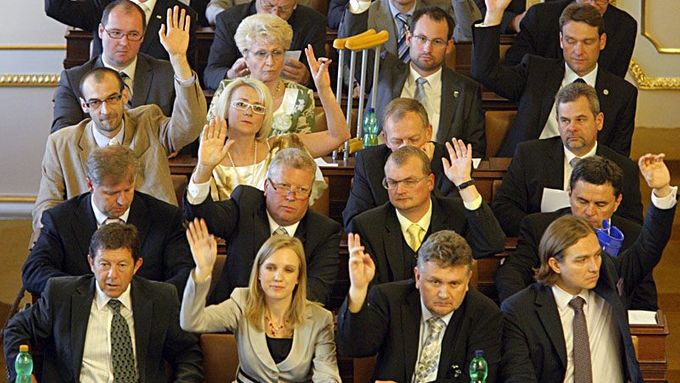Prague - In the first reading, Czech MPs approved the basic parameters of the most important bill of the year - the 2011 budget.
The deficit is planned to be CZK 135 billion (EUR 5.4 billion), or 4.6 percent of the GDP.
The proceeding was no easy process - many personal insults were made by the speakers in the Chamber of Deputies, and both the coalition and the opposition engaged in vicious scaremongering. The left-wing opposition spoke of pauperization of the Czech lower class, while the government coalition warned against far-reaching damage to the Czech economy if the budget cuts will not be approved.
Read more: Czech govt loses majority in Senate. Reforms in danger
However, a closer look on the way how the government plans to spend taxpayer money in 2011 shows that it does not really matter whether is the Czech Republic ruled by the Social Democratic Party or, as it is today, by a coalition that proclaims its right-wing orientation.
Read more: Czech government approves austere budget and tax hikes
Aktuálně.cz has compared the budgets the Czech Republic has had in the last ten years. It appears that the 2011 budget carves up the taxpayer money more or less in the same manner as the previous budgets did.
80 to public, 20 to firms
The average employed Czech will pay to the state CZK 158,000 (EUR 6,320) in 2011. From this sum, the state will give 40 percent on welfare benefits, out of which 30 on pensions.
Read more: Czech pension system collapsing: budget gap widens
Then, 20 percent will be used to cover the operation costs of Czech ministries and state offices, which include police and courts on state, regional and local levels. Another 10 percent will be spent on education and research.
Read more: Czech students to pay fee at university, parties agree
At this point, not much is left.
Health care, the army and private companies (above all agricultural producers) will each get 5 percent. Then, 10 percent will be used for highway construction and infrastructure in general.
Read more: Czechs to build new pipelines amid gas crisis fears
The state also has to keep in mind that it will have to pay 6 percent to banks in interests.
With some slight changes of no more than 3 percent, all Czech budgets in the last decade were structured in this way, regardless of the political orientation of the governments and the finance ministers that prepared them.
The only significant change is that Czechs are more and more living beyond their means. They want to pay lower taxes and spend more. Since 2001, the tax collection has been growing a little bit slower than the economy, but the spending has got faster and faster. This trend is more visible every year.
Ten years ago, the state could borrow CZK 7 for every 100 it spent. Today, it has to borrow 11, and in addition will get 7 from the EU next year.
This trend remains unchanged in spite of repeated reforms packages and cuts. While the state now spends less taxpayers' money on social benefits, health care, education and state offices, it pays more for regional and local bureaus.
The pension expenses are growing - from every CZK 100 bill it collects in taxes, the state now spends on pensions CZK 3 more than in 2001. However, the state has managed to cut other welfare benefits.
The army, diplomacy and secret services are the sectors that feel the cuts most painfully. While in 2001 they got 8 percent of the budget, in 2011 they will have only 4 percent.
Growing subventions
However, in spite of the cuts, the debt gets bigger every year. And every Czech crown saved goes to private sector heavyweights.
Thanks to state investments and subsidies, 5 percent of taxpayers' money ends up in the pockets of the largest construction, industrial and agricultural companies. In addition, 6 percent of taxpayer money go to banks as interests - this is two times more than in 2001. This means that the private lenders already get larger part of the budget than the agricultural-food complex, which has always been the largest receiver of state subsidies.
In sum, if state investments and subsidies to private companies had not grown in the last 10 years, the Czech Republic's budget deficit will be only a half of what it is now.
